I often have a hard time describing what I do to other musicians.
This sounds kind of strange, I know . . . I’m a musician myself!
And yet, when I think about it, I don’t seem to have any trouble describing what I do to the venues I work for.
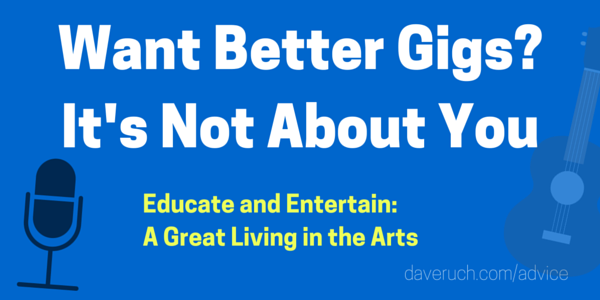 Why would this be the case?
Why would this be the case?
Well, for one, I do some pretty oddball things, like teaching people to play the spoons, and singing songs from 500 years ago at 8:50am in elementary school libraries and cafetoriums.
(Yes, that’s cafeteria-meets-auditorium.)
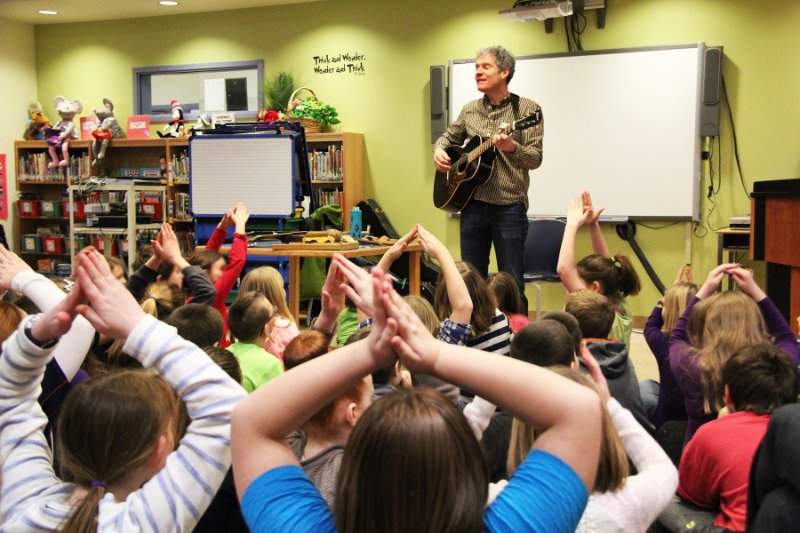 That can be hard to explain to just about anyone other than the people I do it for!
That can be hard to explain to just about anyone other than the people I do it for!
But I think the bigger issue here is that over the last twenty-five years, without really thinking too much about it, I’ve been slowly but surely structuring everything I do to be as useful as possible to the end user.
Actually, to two end users – – the audience, and the person who books me.
I’ve almost forgotten how to describe it in musician terms.
The Conversation
So when another performer asks me what I do, it might not even occur to me to mention the instruments I play (guitar, mandolin, banjo, etc) or the kind of music I do (oldtime, traditional folk stuff, some swing, historical music, etc.).
Instead, it often goes something like this:
FELLOW MUSICIAN “So what do you do?”
ME “Well, I do a lot of work in schools, and….”
FM “(blank stare…) Oh, you’re a teacher?”
ME “Well no, I go into schools and do performances for kids on history topics.”
FM “Oh. Cool. (scratching head….)”
ME “I also have a band!”
FM “Oh, awesome. Where do you guys play?”
ME “Um, well, we don’t really play in bars or clubs too much. We do concerts for sit-down audiences at places like museums and regional concert series and folk music events.”
FM “Oh. Huh. OK, good talking to you…”
It seems that I’ve gotten very used to thinking about what I do in terms of who it’s for and what its function is, rather than what it is.
In other words, my work has gradually become less about me, and more about them. What do the places I’m working for need?
How can I help them be super happy?
 Interestingly, my income and opportunities have steadily increased over this same period of time.
Interestingly, my income and opportunities have steadily increased over this same period of time.
And this makes perfect sense.
Our audiences and the people who hire us don’t really care about us.
They care about themselves, first and foremost.
In our careers as performing artists, we can all benefit from keeping this universal human truth in mind as we think about ways to market ourselves, how we structure our performances, and how we approach our interactions with our audience.
Mad Men Knew How To Get Gigs! (and sell detergent)
None of what I’m saying is new.
The advertising and marketing worlds have been applying this principle for a long time.
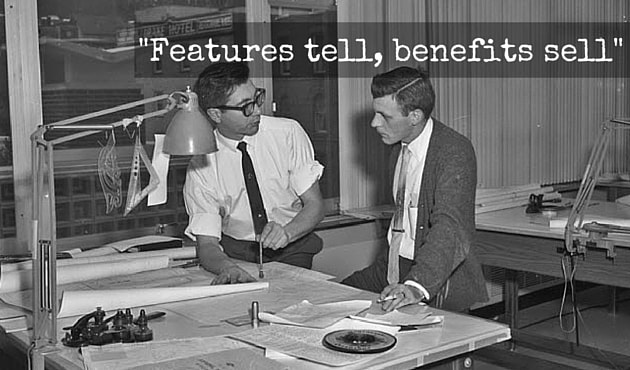 Let’s say we’re being considered for a booking somewhere.
Let’s say we’re being considered for a booking somewhere.
Does the venue really want to know who we’ve opened for, or what award we got in 2017, or even what our latest CD sounds like?
Not so much.
Those are the features – they’re all about us, and are (mostly) boring.
The benefits of what we do, on the other hand, are about them – what do they get out of it?
This is precisely what’s important to our end user.
I love the way Dale Carnegie put it:
“I know and you know people who blunder through life trying to wigwag other people into becoming interested in them. Of course, it doesn’t work. People are not interested in you. They are not interested in me. They are interested in themselves – morning, noon and after dinner.”
 That person considering you for a booking cares not about your latest video or who your influences are, but about doing their job well and making their audience happy.
That person considering you for a booking cares not about your latest video or who your influences are, but about doing their job well and making their audience happy.
So, instead of blathering on endlessly about ourselves and what we do, let’s show them (through testimonials) and tell them, in our own words, what will happen when we’re there.
How does it serve their audience and their needs?
Let’s put the “what’s in it for me?” right up front, just like Sheraton-Heathrow did here:
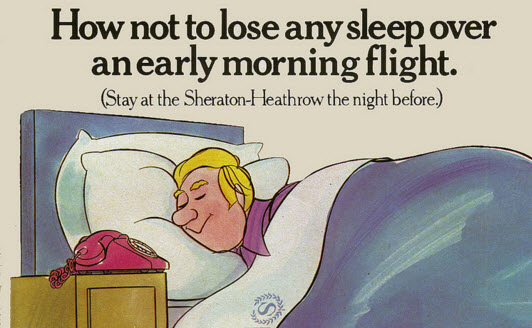 We might even consider creating some new programs, concerts, or productions around the needs of our venues and audiences – imagine how popular those would be. (I talked about doing that for schools here.)
We might even consider creating some new programs, concerts, or productions around the needs of our venues and audiences – imagine how popular those would be. (I talked about doing that for schools here.)
Getting From Features to Benefits
Here’s a simple method from Brian Clark at Copyblogger for turning each of your features into benefits (from the article Does Your Copy Pass the “Forehead Slap” Test?).
I’ve tailored it just a bit for our purposes.
- Make a list of every feature of what you do (how long you’ve been performing, awards you’ve won, where you’ve been booked, etc.)
- Ask yourself why each feature is included in the first place.
- Take the “why” and ask “how” does this connect with the desires of the person who hires you?
- Get to the absolute root of what’s in it for that person based on their needs.
Figuring Out What They Need
So if we’ve got two end users – our audiences and the venues that hire us – we’re going to have two different sets of needs.
Let’s look at both.
End User #1: Client/Booker/Venue
What does the person who hires you need?
First and foremost, if they haven’t had the pleasure of hosting you before, they need to know you do a great job, and that you’re easy to work with.
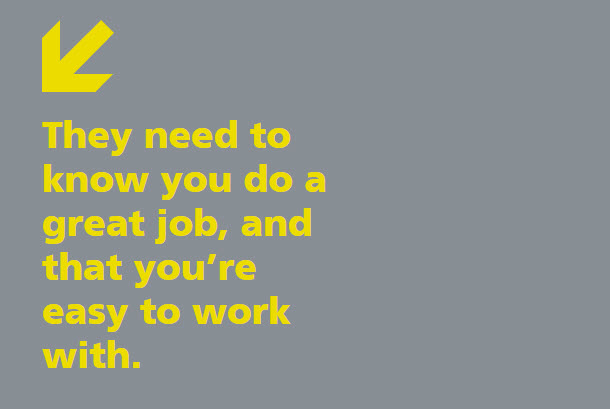 Show them very clearly how thrilled other venues and audiences have been with your performances through the use of social proof.
Show them very clearly how thrilled other venues and audiences have been with your performances through the use of social proof.
Ask them about what else they’ve done – who have they booked, and what have their audiences responded to?
Get to know what their goals are so you can partner to help accomplish them. Do they want to be bringing in more families? Can you gear your performance to an older crowd? Do they like performances to be interactive?
Be super reliable and efficient in your communications with them – they’re busy.
And then, once the show is booked:
- help them promote it
- be timely with communication
- make their audience really happy!
Audience
What are your audience’s needs?
That depends alot on the types of gigs you do, but if they’re like most audiences, they want to feel something.
They want to be entertained.
They probably enjoy learning something new.
They like to laugh, and they may wish to interact with the performance in some way, or with you afterwards.
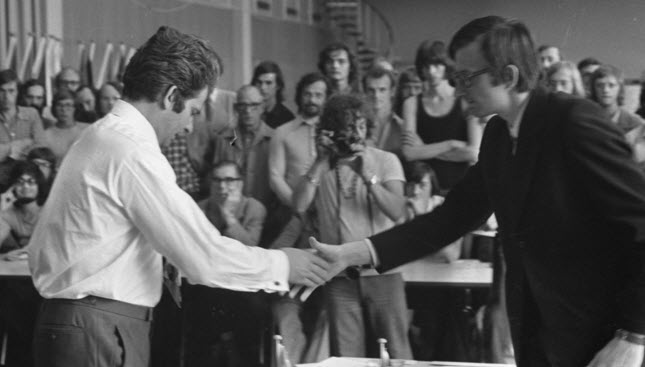 The more we can be mindful of these things as we design our shows – and in real time while we’re performing – the happier our audiences will be.
The more we can be mindful of these things as we design our shows – and in real time while we’re performing – the happier our audiences will be.
And the happier our audience is, the happier our client, booker, or venue will be.
And so it goes.
Want More Gigs? Here’s A Final Question or Two
OK, so with them in mind, how can you take what you do and make it super useful for the venues you work for?
What can you do to really engage your audiences?
Let’s talk about it in the Comments section below.
[optin-monster-shortcode id="fdgnbmzohfbdvlnr"]
About The Blog
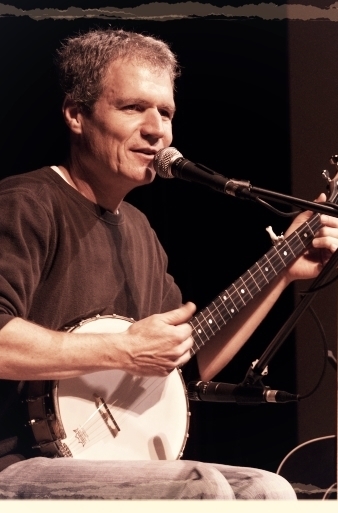 Since leaving a white-collar marketing job in 1992, Dave Ruch has been educating and entertaining full-time in schools, historical societies and museums, folk music and concert venues, libraries, and online via distance learning programs.
Since leaving a white-collar marketing job in 1992, Dave Ruch has been educating and entertaining full-time in schools, historical societies and museums, folk music and concert venues, libraries, and online via distance learning programs.
Along the way, he’s learned a great deal about supporting a family of four as a musician.
The Educate and Entertain blog provides articles, tips, encouragements, and how-to’s for regional performers (in any region) interested in making a great full-time living in the arts.


Great article. I have also taken this approach and enjoyed getting your take on it. I had heavy conservatory training and we were not taught to really cater to the audience or venue. I have learned this over the years making my living as a guitarist. It’s very rewarding to feel that you can really connect with people in all different types of situations. The people who hire you can easily feel that and will ask you back!
Thanks for jumping in here Judy to share your experiences!
“It’s not about you!” Exactly! Audience volunteers are the stars of our interactive Edutainment programs. As the former GM for a small, international Internet company, my doctor told me that my job stress was killing me. Long story short – today I am a full time children’s entertainer and musical ventriloquist, but we only perform WITH children ages 2 to 102..
Well,looking at this leads me to a question I was recently asked. I was invited to perform at a community Talent show with no money prizes, it’s all run by volunteers. The first time I did a talent show 3 years ago, I received requests after the show to do 3 private gigs. But since then, it’s been hard to get any performance or teaching opportunities. I’ve been keeping my prices at going rates, but to no avail. Would doing a talent show be even worth my time? Or better yet, can I use the talent show as a promotional tool? Thanks. Zipporah
Not sure that I can answer that for you Zipporah, but good luck with it if you decide to do it!
I thank u for the opportunity and appreciate your advice and open to your opinions I look forward to working with you and learning more about marketing and the wider audience and community
wow! thanks for this article dave! you might think you’re stating the obvious, and it actually is a simple truth, but the fact is that i guess everyone does go on about themselves to much…
so please keep “stating the obvious”, as it is clearly not obvious at all.
This is a brilliant article, Dave! A mentor just sent me your site. I’m an opera singer by trade (but I sing more than just opera!). I also teach voice and piano and write for Modern Singer Magazine. This article speaks truth to something I never really knew consciously, but makes perfect sense. I’ll definitely be implementing and thinking about this in the future!
Thanks for checking in here Candice! Glad this was helpful.
Great article Dave. You are opening a whole world of possibilities for me things I never thought of before. I’m working towards giving up the day job and long ago gave up cheap gigs. I’ve recently moved so I’m in the process of establishing myself in a new and better environment. I would appreciate any thoughts on this matter.
Hey Denny – glad to hear it. There was some discussion on getting established in a brand-new environment right here – scroll to #5.
Hope that helps.
You are amazing! I have been racking my brain for years of how to combine my passions, of performing, meditation, and social change education. I think your model is perfect and just might work for me. Thank you!!! I just got done writing out a mini business plan.
Great to hear, Skyler. If you haven’t seen these yet, the articles Themed Shows Get Booked and Right Under Your Nose might be really helpful for you.
Thanks man!
Thank you for your valuable marketing knowledge, Dave.
I’ve been performing regularly every month at one senior community for 18 years. One of the reasons they ask me back is because I play requests from the audience. It makes them feel like I’m playing their request just for them and not so much what I would like to perform trying to entertain them. I always try to connect with audiences. I’m there for them, not for myself.
Thanks again, Dave. You are a marketing genius!
I speak at nursing homes and love it. I love old people and they like my talks b/c I’m talking about my WWII tour of Europe and stories told to me by 250 WWII vets I’ve interviewed. Everyone has a story including old people.
Great article. Always great input. I think this applies also to selling music. Same approach. Don’t you think ?
Thanks for sharing your insights.
Thank you sir.
Another good article from you Dave. . I’ve been doing similar to you for some years now. Places that come with an audience pay me to perform. I can really relate to your newsletters.
Glad to hear that Linda. Are you in Canada?
Thanx, Dave. Very insightful. My wife n I are a duo that does a lot of coffeehouses n some small venues like that. Your insights were a “duh! How’d we we miss that?” moment for me.
Thanks so much for commenting Tom. I’m glad this was helpful!
I love your approach! As an example of pushing the envelope, some of the best performances I’ve had have been at political rallies where I have a much clearer sense of why some music is better than wall-to-wall speeches! I am finding that with each gig I have a sufficient but flexible set plan. I depart from this as soon as we get a chance to share what is happening IN THE ROOM right there. Even inside jokes can arise over 45 minutes with an audience! I would like to know more about translating the ability to engage almost anybody into a “draw” or”following”, but its just been a year since I revived my career, so I am settling in for the ride! Thanks for your really unique perspective. Here’s my email, the more contacts the better, so share early and often!
Thanks for the good words Clifford! I’ve added you to the subscription list so you can look for a new article in your inbox each Monday.
Great article Dave. You definitely got a new follower. after I’d read this one I’m sure you are doing great job and I will enjoy your writings for now on…
This article is full off useful stuff that every performing artist/band/musician etc. should think about more often.
I got few “new” ideas or ways to think (and what to keep in mind as a musician, band member and teacher or mentor for my students. And the audience too. I play most of the gigs in bars and clubs where it’s absolutely necessary to keep the bookers and owners happy and give your best for them. Otherwise it can or will be your last time in their club…
Keep up the good work Dave!
Hi Kalle – thanks so much for your comments and I’m glad you got some value out of the article. From your email address, I’m wondering if perhaps you’re in Finland? I’ve been over there twice and love the country. Best wishes.
Unless it was “Free Bird” you were all asking for!
I went to a gig recently by a band who I regularly follow. There’s always one song that the crowd bay for and we duly roared out that we wanted to hear it again.
The expression on the keyboardist face was sort of “oh here we go again”. You could see that he didn’t want to play it again. Arrogant sod.
I think he needs to read this blog!
Dave, the cream is definitely coming to the top! Your blog is not only incredibly insightful but inspirational to the true artist who has the gift of music in his or her soul! Thank you for sharing so much with us!
Wow John Jensen Ru – I appreciate your comments and am certainly glad you’re finding some value in the articles. Thanks.
Good thoughts. Reinforces something sent me a week or two encouraging bands (and musicians) to realize it’s really all about what the audience wants, not what the band wants, and not about how the performer expects the audience (and venue) to respond to what the he/she/they want by way of appreciation. It really puts the shoe on the other foot. And I don’t mean selling out, either, but rather understanding that the audience (and venue) has expectations, and you need to consider those if you’re going to make people happy they booked you. You can’t be the suffering artist. You have to connect with the crowd.
Well said Michael!
Aww Dave, I’m soooo jealous ( not in a mean way) I’ve always, always wanted to sing, and play my guitar for schools, day care centers, community centers, etc. teaching about history, and being positive. I think what you are doing is great and inspirational! Music is suppose to teach, and uplift the listener, not glorify the player. God Bless!!!!
It’s never too late Karen! Thanks for the good words.
Wonderful stuff Dave. As you say not new but sadly most musos don’t want to listen. As far as they’re concerned they are “artists” and therefore the whole world and its significant other will beat a track to their door cos their music is soooo good.
Yeh right.
Excellent presented blog and easy to read.
Love it. I want to have your babies! smile emoticon
The Legendary Frank
Ha! Thanks Frank (I think…).